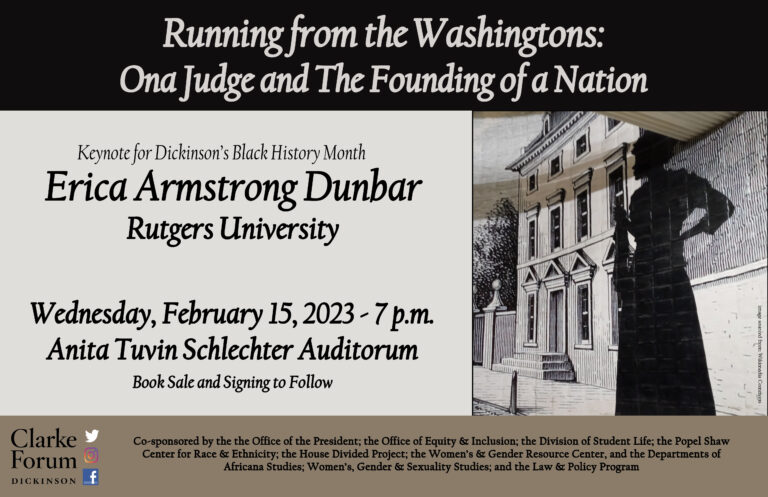Dunbar Tells the Story of Ona Judge in Black History Month Keynote
The Clarke Forum for Contemporary Events hosted Erica Armstrong Dunbar to give the presentation “Ona Judge and the Founding of a Nation.” Dunbar is the Charles and Mary Beard Distinguished Professor of History at Rutgers University, the national director of the Association of Black Women Historians, and the director of the program in African American history at the Library Company of Philadelphia.
Her speech centered on her journey learning about and studying Black history, and the story of Ona Judge, who Dunbar spent almost a decade researching.
Dunbar’s 2018 book “Never Caught” tells the story of how Ona Judge, a 22-year-old enslaved woman, fled from the household of George and Martha Washington — then President and First Lady of the United States — and spent the rest of her life as a fugitive.
In her speech, Dunbar gave a preview of the book and talked about Ona’s remarkable feat to share the life of a brave woman who has often been disregarded in history. Judge was born in 1773 to Andrew Judge, a white indentured servant, and Betty, an enslaved woman at the Washingtons’ plantation Mount Vernon.
At age ten, she began working in the manor house as a seamstress, and soon was tasked with being responsible for Martha Washington’s private life. She helped her bathe, did her hair, mended her clothes and more. As Dunbar remarked, she would have been “always present, never seen” to the Washingtons, a necessary but invisible part of their lives.
At age 16, while George Washington was serving as President, Ona was selected to travel with the family to New York and later Philadelphia, with eight other slaves and many other servants, one of whom was her older brother Austin.
Philadelphia was unique in the landscape of the early United States because of its considerable population of free Black Americans and the minimal number of enslaved people within its limits. Quaker philosophy had a considerable influence on the city, and many wealthy Philadelphians had long moved away from supporting slavery. According to Pennsylvania’s 1780 gradual abolition law, slaveholders could only have their slaves in the state for a period of six months, after which they would be automatically freed.
This was a problem for George Washington, who devised a rotation plan in which he regularly moved his enslaved people back and forth from Virginia in order to circumvent the law. As Dunbar noted, he intentionally deceived both his slaves and the American public about these actions.
Ona endured this for six years, until in 1796, Martha Washington made the decision to give Ona away as a wedding gift to her granddaughter Eliza Custis. Eliza was known for her rude, hostile personality, and Ona did not have a good opinion of her. So, on May 21, 1796, Ona made the courageous and risky decision to run.
Four days later, an ad was placed seeking information on her whereabouts. George Washington pursued her up until his death, but she maintained her status as a fugitive in New Hampshire and secured her liberty until her death.
During the Q&A session, Dunbar reflected on the impact that she hopes to have on people with her work and the story of Ona Judge. Already, she has inspired change at the Mount Vernon Museum itself, where there is now an exhibit on the enslaved people of the plantation, and a marker to Ona Judge. She said that she hopes to make history accessible in order to change people’s preconceived notions about the past.







